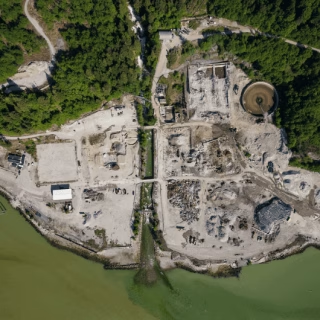Construction of the $5.1 billion Woodfibre LNG project near Squamish, British Columbia, has now reached its halfway milestone. The progress was marked by the arrival of four new modules, including two pipe racks, a boil-off gas compressor, and a flare knock-out drums module. Each of these units plays a critical role in ensuring safety and efficiency at the facility.
The decision to use modular construction not only enhances safety but also improves scheduling and quality control. Importantly, the project is also setting a new precedent by granting the Squamish Nation full authority as the environmental regulator, reflecting a landmark agreement in Indigenous participation and oversight.
Project Factsheet: Woodfibre LNG
Total Investment: $5.1 billion.
Location: Near Squamish, British Columbia, Canada.
Ownership: 70% Pacific Energy, 30% Enbridge.
Current Status: Construction has passed the halfway point.
Key Modules Arrived: Two pipe racks, boil-off compressor, and flare knock-out drums.
Facility Goal: World’s first net-zero LNG export project.
Power Source: Hydroelectricity with electric drives to cut emissions.
Environmental Oversight: Squamish Nation serves as full regulator.
Operational Start: Expected by 2027.
Capacity: Up to 2.1 million tonnes per year of LNG.
Cost Challenges: Rising costs due to site conditions, codes, and worker housing.
Community Impact: Hundreds of jobs and economic stimulus for Squamish.
Driving Sustainability Through Innovation
Woodfibre LNG aims to redefine LNG production by minimizing emissions and maximizing efficiency. By using hydroelectric power and advanced electric drives, the project is set to avoid more than 230,000 tonnes of greenhouse gases compared to conventional LNG facilities. This positions the plant as one of the cleanest LNG projects globally, reflecting a broader industry shift toward sustainability seen in ventures such as McDermott’s MSA for the proposed $25 billion Monkey Island LNG export facility in Louisiana.

Economic and Regional Importance
Beyond its technological advancements, the project has significant economic value. It provides employment opportunities and injects long-term benefits into the Squamish region. At the same time, Canada strengthens its global energy position, joining other projects like Cedar LNG, which is majority-owned by the Haisla Nation and expected to start operations in 2028.
Looking Toward Completion
Despite cost escalations, the project remains on schedule for completion in 2027. Once operational, Woodfibre LNG will not only support global LNG demand but also showcase how sustainable practices and Indigenous-led oversight can redefine major energy infrastructure, similar to innovative offshore ventures like the world’s largest floating LNG facility.

Leave a Reply